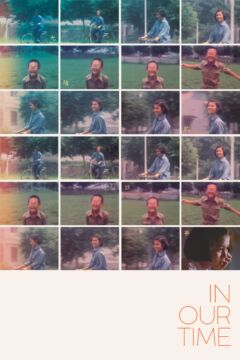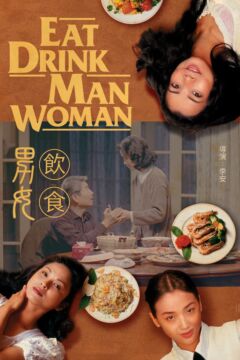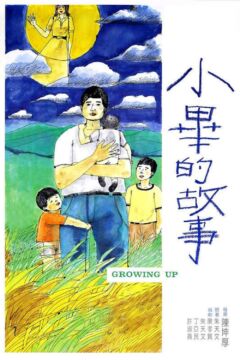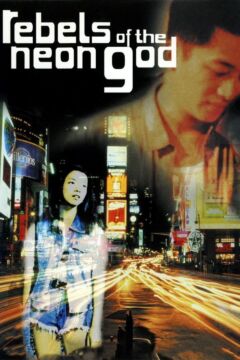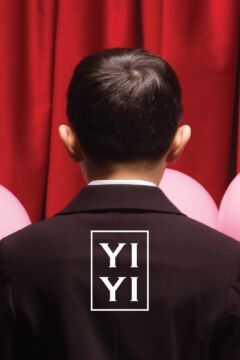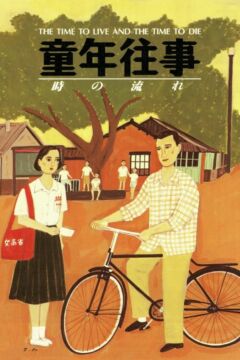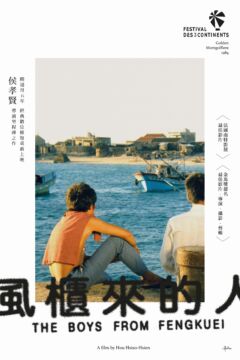Starting April 20th KINO is proud to present Taiwan New Wave: Lives Less Ordinary [臺灣新浪潮電影 平凡不平凡] and (re)introduce you to nine masterpieces from the Taiwan New Wave. These classics have remained underseen in cinemas, so it’s high time to showcase them on KINO’s grandest screen. Featuring films from the first and second wave by Edward Yang, Hou Hsiao-hsien, Ang Lee, Tsai Ming-liang and more. The films of this revolutionary movement in cinema history were artistically innovative, but also in their realistic portrayal of the Taiwanese people. They illustrated societal and economic shifts, much like Italian Neorealism in the 1940s. By capturing their cultural identity, these filmmakers created their own voice and their own national cinema
For tickets and more information, please visit website: https://kinorotterdam.nl/special/taiwan/
Taipei Story (1985) 青梅竹馬
A young woman urgently seeks to navigate the maze of contemporary Taipei and find a future. She hopes that her boyfriend Lung is the key to the future, but Lung is stuck in a past that combines baseball and traditional loyalty that leads him to squander his nest egg bailing her father out of financial trouble.
The English title of this film is a direct reference to Yasujiro Ozu’s Tokyo Story (1953), which also focuses on how a nation and its city are moving away from traditional values. Taiwan experienced an economic boom in the 1980s and Yang’s film delves into the difficulties and uncertainties this brought to the young people. We follow a couple who try to build a life together but are trapped in between traditions and modernity in a rapidly changing city and grow more distant from one another. Although it’s made in 1985, we believe the film still feels relevant to audiences worldwide so many years later. Taipei Story gained international recognition after its restoration in 2009 as part of the Film Foundation’s World Cinema Project led by Martin Scorsese. Join KINO for the official opening on 20 April with an introduction by our programmer, cocktails are included in the ticket price.
ZA 20 APR 20:00/ DO 16 MEI 21:00/ DI 4 JUN 21:00
In Our Time (1982) 光陰的故事
Four vignettes, each set in different decades from the 1950s through the 1980s, deal with protagonists at different stages of life between childhood and young adulthood.
This anthology film, directed by four different directors, is historically significant as it launched the Taiwan New Wave. All directors were newcomers to filmmaking, including Edward Yang. It might be difficult to see its significance nowadays, but it’s important to realize its historical importance. It was the first film that broke away from the usual escapism, melodramas and action genres for the masses, which were no longer serving the audiences. The directors wished to create cinema that reflected contemporary life by focusing on the stories of ordinary people with an emphasis on different life stages and coming-of-age stories. Taiwanese New Wave got kickstarted and would later refine these themes, narrative and cinematic style even further, as we will see in other films that are a part of this program.
DI 23 APR 21:00/ DO 23 MEI 21:30
Eat Drink Man Woman (1994) 飲食男女
A senior chef lives with his three grown daughters; the middle one finds her future plans affected by unexpected events and the life changes of the other household members.
The third feature and only film by Ang Lee in our program, who was part of the Second Wave of the Taiwan New Wave. The Taiwanese-born American filmmaker is best known to Western audiences for Crouching Tiger, Hidden Dragon (2001) and Brokeback Mountain (2005) and has a very diverse filmography. This film is the last installment in his Taiwan trilogy, which also includes Pushing Hands (1991) and The Wedding Banquet (1993). This film about a widowed father who lives with his three beautiful adult daughters, explores conflicts between traditional values and a Western-influenced modern perspectives between generations without it being too heavy and maintaining a sense of humor and entertainment.
DO 25 APR 21:00/ VR 10 MEI 21:00
Growing Up (1983) 小畢的故事
The story follows a young man as he changes from an intelligently aware youth, to a teenager with much less confidence than he once had, and finally, to a stable adult.
The only film in our program directed by Chen Kun-hou, who served as a cinematographer for many of Hou Hsiao-hsien’s films. Released in 1983, considered a breakthrough year for the movement and holds a special place in the movement’s history, yet remains underseen, especially in Europe. The story revolves around a boy’s coming-of-age experiences set in a small coastal town, but also delves into the struggles faced by his mother, as she had to marry an older man to support her son. What sets this film apart in narrative style is that it isn’t told from the boy’s perspective, but through the eyes of a girl who admires him. Both heartwarming and heartbreaking at the same time and we think it has one of the best representations of stepdads in cinema.
ZO 28 APR 19:00/ DI 11 JUN 19:15
Rebels of the Neon God (1992) 青少年哪吒
Defying his parents, disaffected youth Hsiao Kang drops out of the local cram school to head for the bright lights of downtown Taipei. He falls in wit Ah Tze, a young hoodlum, and their relationship is a confused mixture of hero-worship and rivalry that soon leads to trouble.
This debut film of Malaysian born filmmaker Tsai Ming-liang who works and lives in Taiwan has a very different tone and approach compared to other films in our program as it has a very bleak perspective. Set in the early 90s Taipei, we see a darker side of the urban life and its youth, who struggle with their parents’ expectations and can’t make connections in modern life. They feel alienated and respond with apathy and violence. Visually stunning, with neon-lit scenes of crowded streets, arcade halls and skating rinks, reminiscent of Wong Kar Wai’s neon aesthetics of Hong Kong.
DI 30 APR 21:00/ ZA 25 MEI 21:30
Yi Yi (2000) 一一
Each member of a family in Taipei asks hard questions about life’s meaning as they live through everyday quandaries. NJ is morose: his brother owes him money, his mother is in a coma, his wife suffers a spiritual crisis when she finds her life a blank and his business partners make bad decisions.
Edward Yang’s last film Yi Yi (he passed away in 2007) is considered his magnum opus. A Brighter Summer Day (we still owe you this one) is another remarkable film, however Yi Yi might be considered more accessible for Western audiences. We follow the Jian family’s individual lives, over the course of a year. The opening scene is set at a wedding and the film concludes with a funeral, symbolizing the cycle of life. The film’s storytelling approach doesn’t rely on dramatic plot twists. Instead, it mirrors real life, capturing ordinary moments we all might experience in our lives. Visually, Yang uses long takes and distant shots, deliberately avoiding close-ups and yet this film feels very intimate. This technique invites viewers to become conscious observers and enables us to focus on every detail within the scenes. Yang’s swang song won him the best director prize at the Cannes film festival of 2000. Note: this film will be screened with a 20 minute intermission.
DO 2 MEI 20:00/ ZA 18 MEI 20:00/ DO 13 JUN 20:00
Dust in the Wind (1986) 戀戀風塵
A-yuan and A-yun are both from the small mining town of Jio-fen. They move to Taipei, where A-yuan is an apprentice by day and goes to night school, and A-yun works as a helper at a tailors. Everyone thinks they are meant for each other, and so do they. They fail to see time and fate are beyond their control.
Another milestone in Hou Hsiao-hsien’s career and the second collaboration with cinematographer Mark Lee Ping-bing (known for his work in In the Mood for Love and Café Lumiere). The film follows a young man’s transition from childhood to adulthood, as he and his sweetheart leave their rural hometown for the bustling city of Taipei. The contrast between country and city life, and the train that connects these two places, is depicted beautifully in the cinematography. Drawing inspiration from the French New Wave, the film masterfully uses ‘the ambiguous temporal ellipse’ technique, reminiscent of Jean Luc Godard’s Pierrot le Fou. Unlike the latter, where the shots are confusing for the audience, Dust in the Wind shows smoother transitions, subtly explaining gaps between shots and ensuring a seamless viewing experience. Which allows you to experience the film beyond its plot.
ZA 4 MEI 21:00/ DI 14 MEI 19:15/ DO 6 JUN 21:30
The Time to Live and the Time to Die (1985) 童年往事
When a family makes the move from China’s mainland to Taiwan, the elder members struggle to adapt in their new environment while Ah-Ha, a young boy, gradually reaches maturity. The generation gap grows fearsomely wide, threatening to alienate the young man from his family and their traditions.
This portrayal of the family’s journey and struggles moving from mainland China to southern Taiwan in the late 40s is still considered one of the best coming-of-age films from Asia. Once again, director Hou Hsiao-hsien draws from his life experiences (having moved to Taiwan at the age of 4) and delivers a deeply personal and nostalgic film, without it ever becoming melodramatic. We follow the challenges of a boy growing up and adapting to a new culture, navigating societal norms and pressures. Again, as in many of his Hou’s films, longing for tradition and home is present, but also the desire to be in the here and now by the lead character.
DI 7 MEI 21:00/ DO 30 MEI 21:15/ ZA 8 JUN 19:00
The Boys from Fengkuei (1983) 風櫃來的人
Ah-Ching and his friends have just finished school in their island fishing village, and now spend most of their time drinking and fighting. Three of them decide to go to the port city of Kaohsiung to look for work. They find an apartment through relatives, and Ah-Ching is attracted to the girlfriend of a neighbor. There they face the harsh realities of the big city.
While this isn’tHou Hsiao-hsien’s debut, he considers it his first real feature, perhaps because his earlier works were more mainstream romantic comedies. It also marks his first of many collaborations with Chu Tien-wen, she would go on to write most of his scripts (and a lot of other screenplays of the Taiwan New Wave). With this film his style of filmmaking and thematic focus began to shift to a more personal approach, as he drew from his own experiences and memories. It was with this film that he got recognition for his cinematic style at international film festivals: long takes, a fixed camera, and framing that captures small stories of ordinary people. The observant viewer may notice that the mise-en-scène is reminiscent of Yasujiro Ozu’ style and story wise, it bears resemblances to Federico Fellini’s I Vitelloni.
DO 9 MEI 21:00/ DI 21 MEI 21:00/ ZA 1 JUN 21:30

